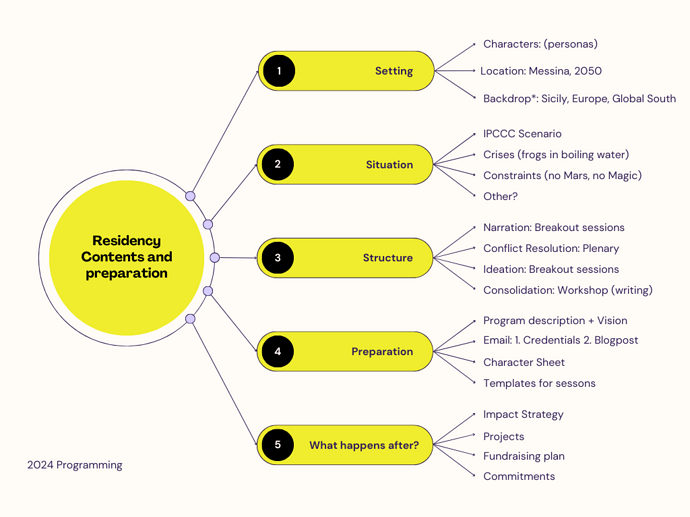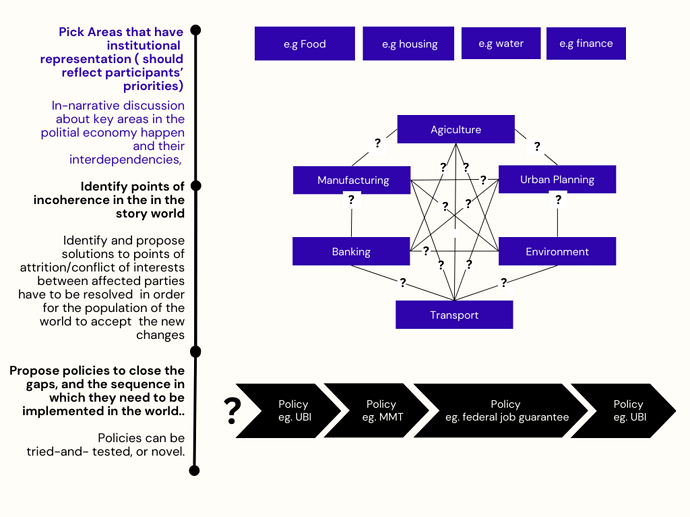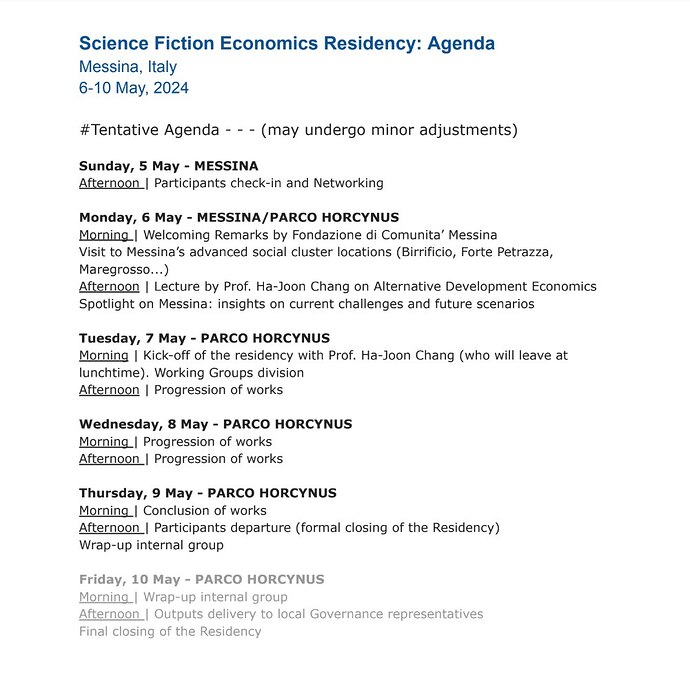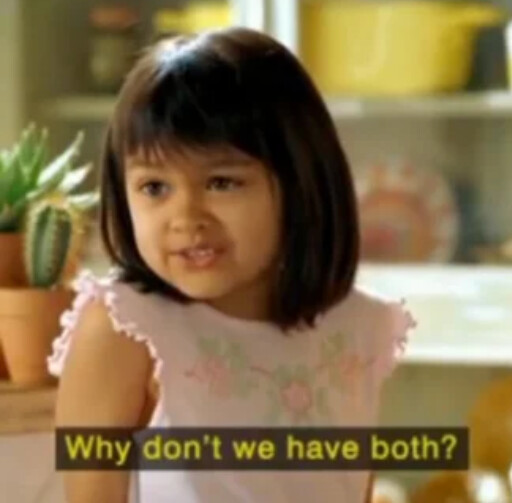Goal
Cocreate narratives of life in different paris-compliant futures and how we got there, complemented with slower & more contrarian work (this cannot work with that/ … ensuring creative storytelling is robust and credible for real-world circumstances).
What narratives of paris-compatible futures can people come up with for a pre-defined location? What realistic transition paths did they use to get from where they are today (what economic thinking, policy instruments and strategies for implementation that take social dynamics into account)?
Residency Process
The process below should be split across dedicated breakout and plenary sessions…
- Participants Priorities - Pre-event Personal Introductions posted on forum here
- Who are you?
- What leads you to participate in this event?
- Connect what you would like to see happen/discussed during the event to something you are working on IRL
- Characters - Collaboratively created here pre-event & Introduced
- Setting - Messina 2050,
- how present is climate change in consciousness and public discourse? How are residents currently thinking/ acting on issues? Where are they now on that sliding scale (and implications on adaptation and loss and damages). - Spectrum exercise…at one extreme end, these goals have been met…at the other none. Where are we now? put your self on the spectrum and explain your position.
- Institutional goals: Translation of Post-Paris goals translated into local context based on official documents e.g Regional Development Plans or Mayors’ convention - @Nic010 - we need this from Messina team
- quantified +
- non-quantified, a
- Major Challenges/ Crises it faces - Tbd on Day 1
- Narration Exercises: We are in 2050, a (crisis) event happens in Post-Paris Messina…
- Where is your scenario on the spectrum and where is your setting (physical location e.g waste site or port or buss or whatever).
i. Pick your character and how they are related/ connected to messina: how do our characters respond to navigate/ mitigate the event? How do others in their environment? (Individual, Collective, Institutional)
ii. What historical developments and choices/ critical “infrastructure” enabled/ lead to these outcomes?
iii. Where along the road have there been points of attrition or conflicts of interest between the characters and people around them?
iv. How were these conflicts related or interdependent? Who were key actors involved and dynamics between them?
v. How were these conflicts navigated? Who were key actors involved and dynamics between them? Enablers (e.g bottom up - top down, social contracts, critical infrastructures, crises, policies/ legislation, political mobilisation, diplomacy etc)
vi. Implications on Paris-agreement goals implementation? (1. Messina Institutional Goals + 2. Participants Priorities +
-
Incoherence identification - still needs a bit of work to hash out the promits and outputs here
-
Policy Implications: The path from here to there
- Policy: @alberto - Please refine method for hashing this out here
- Culture/ Art
- Business
-
Consolidation: We use outputs templates + artistic rendering
Agenda
Day 1: Sharing and Discovering
(@Nic010 please add: location + address)
- Keynote by Ha-Joon Chang, as
- Field visit to exploring the Messina advanced cluster (info in Italian ) as a real-life science fiction economy.
- Messina Briefing: History? Where are there big complex issues in Messina right now? In the future? (what is at stake? what could be at stake?) Ecological Threats most likely in IPCCC scenario?
Discussion Task: Setting - Messina 2050,
- how present is climate change in consciousness and public discourse? How are residents currently thinking/ acting on issues?
- Spectrum exercise…at one extreme end, these goals have been met…at the other none. Where are we now? put your self on the spectrum and explain your position (and implications on adaptation and loss and damages)…
- Institutional goals: Translation of Post-Paris goals translated into local context based on official documents e.g Regional Development Plans or Mayors’ convention - @Nic010 - we need this from Messina team
Outcome: Definitions
- Level of ambition (groups can have different ones)
- The parameters and themes that drive the story forward (major events for discussion tomorrow).
- Give them character sheets (both ones filled in as examples, and ones that are empty that they can fill in themselves).
- What is your name?
- Gender?
- Age
- Abilities
- Origin/Dest - Where do u come from and how did u end up here?
- Motto
- Portrait
Day 2: Narration & Incoherence Resolution
(@Nic010 please add: location + address)
Two-hours thematic parallel sessions. Each session imagines an aspect of a fictional, radically different, conceptually sound economy.
08:30- 09:00 I Team Debrief
Summarise what was said in neutral forml: “text”
09:00-09:30 I Opening
09:30-11:30 I Breakout Session 1
Select level of ambition, location and characters (decide after some discussion and cocreation)
Select event
Narrate.
11:30- 12:00 Synthesis of stories
Put stories into text and check with the group ask to elaborate
12:00-12:30 I Plenary - Present stories & Ask Difficult questions to the stories
Summarise what was said in neutral forml: “text”
12:30-14:00 I Lunch
14:00-14:30 I Opening
14:30-16:30 I Breakout Session 2
Output: Realism Check - Answer questions posed in plenary
- Economics/ Sectors interdependencies
- Social/ Political realism - Incentives
1630-17:00 I Coffee
17:00-18:00 I Plenary - Ask hard questions about economics and policy
And defend themselves (from our narrative perspective it makes/ would more sense to…)
18:00-18:30 I Team Debrief
Summarise what was said in neutral forml: “text”
Day 3: Ideation
(@Nic010 please add: location + address)
Two-hours thematic parallel sessions. Each session imagines an aspect of a fictional, radically different, conceptually sound economy.
08:30- 09:00 I Team Debrief
Summarise what was said in neutral forml: “text”
09:00-09:30 I Opening
09:30-11:30 I Breakout Session 1
Economics and Policy Instruments Discussion - Old and new
Pick key scenes from the day before where the story breaks: Embed the policy instruments and their sequence into bridging elements of “how we got there”
11:30-12:30 I Plenary
12:30-14:00 I Lunch
14:00-14:30 I Opening
14:30-16:30 I Breakout Session 2
Embed policy and history into the narrative arch of the character
Go back to the characters and discuss how the answers in the discussion are embedded into the story and (character development). Conversation starter questions:
* Where felt like home?
* Whatwas your history?
* What was your relationship with the state?
* What was your relationship with your neighbours?
* Abilities (soft/hard/tech/other)?
* What technologies did you use/ how?
* Who did you come to aid without hesitation?
* What were your tasks?
1630-17:00 I Coffee
17:00-18:00 I Plenary
18:00-18:30 I Team Debrief
Summarise what was said in neutral forml: “text”
Day 4: Consolidation
Writers: Synthesising everything into texts (short stories)
Others: Wikipedia entry (Summarise what was said in neutral form).
(@Nic010 please add: location + address)
Curation of the materials generated, with a view towards publication. We need: a smaller curation group on a voluntary basis.
Formats
1 hr Plenaries
2 hr Breakout sessions
Materials here: Topics tagged scifieconresidency
Pre-Event prep
Participants
-
Instructions for use of this platform/ online discussion space + credentials for each participant who doesn’t already have an edgeryders account.
-
Participants post their responses to three questions in a post:
- Who are you?
- What leads you to participate in this event?
- Connect what you would like to see happen/discussed during the event to something you are working on IRL
- Participants get a character sheet to fill in along with some inspiration to help them define characters:
- Descriptions of places
- List of heterodox economic thinking,
- List of policies/ tools (some known and tested, some novel)
- Descriptions of a range of paris-compliant futures (which differ from each other)
Facilitation
-
Plenaries: we will have several - some aim to set the foundations for narrative ideation, others for the contrarian/ rhobusting and others still for weaving it all together
- ideation - content/ format?
- rhobusting/ coherence - content/ format?
- synthesis - content/ format?
- bridging - content/ format?
-
Breakout sessions:
-
2 hour breakout sessions with a task: During the breakout sessions participants will play out interactions between pre-defined characters in a boiling frog scenario at a set location in a specific IPCCC scenario -
-
Each breakout session is set in a pre-defined location, but they all have the same IPCCC scenario as the backdrop and draw inspiration from a list of heterodox economic thinking, policies and contexts/ opportunities for implementation (existing or near future real world work/ contexts participants bring with them).
-
Re-focus prompts: Questions to get conversations in breakout groups “on track” when they veer too far away from a good balance between ideas and coherence building: “our benchmark for successful outcomes of the retreat is our ability to bridge the gap between new ideas and the reality of 'you can’t lift a finger without someone shooting you down”.
- Materials
a. Location Descriptions: identify four locations (descriptions for each are prepared ahead of the events)
b. Character sheets
c. Descriptions of places
d. Prompts for discussions: 1) Plenary (coherence) 2) Breakout sessions (imagination)
e. List of heterodox economic thinking,
f. List of policies/ tools (some known and tested, some novel)
g. Descriptions of a range of paris-compliant futures (which differ from each other)
h. IPCCC scenario
i. Near-future realistic crises (frogs in boiling waters)



